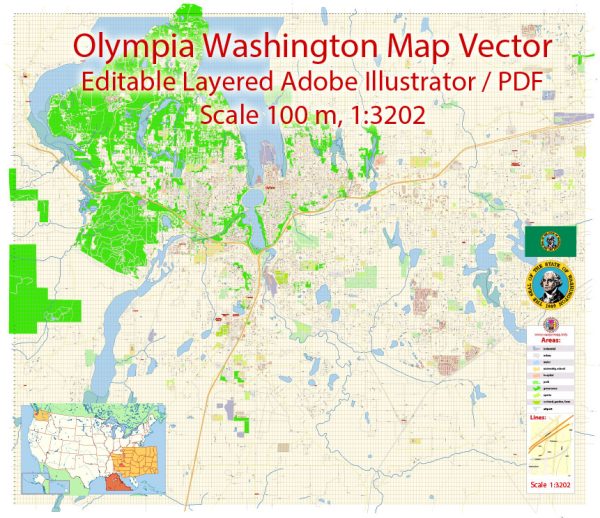Olympia, the capital city of Washington state, has a rich history of urban development that reflects the broader trends and changes in the region. Here’s a brief overview of the history of urban development in Olympia:
- Indigenous Presence: Before European settlers arrived, the area now known as Olympia was home to Indigenous peoples, including the Coast Salish tribes. The Nisqually, Squaxin Island, and Chehalis tribes were among those who lived in the region, relying on the abundant natural resources for their livelihoods.
- Early European Settlement: The first European settlers arrived in the mid-19th century, attracted by the natural deep-water harbor of Budd Inlet. Edmund Sylvester and Levi Smith were two of the early pioneers who established a town in the 1840s. The area developed as a trading post and a supply point for the Puget Sound agricultural and logging activities.
- Role in Statehood: Olympia played a pivotal role in Washington’s bid for statehood. It was chosen as the state capital in 1853, partly due to its central location within the Puget Sound region. The city’s growth was influenced by its status as the political center of the state.
- Logging and Maritime Industry: Like many other cities in the Pacific Northwest, Olympia’s economy was heavily dependent on logging and maritime activities during the late 19th and early 20th centuries. Timber from the surrounding forests was transported through Olympia’s port, contributing to the city’s economic prosperity.
- Capitol Campus: The construction of the Washington State Capitol Campus began in the late 1920s and was completed in the 1930s. The Capitol building and its surrounding structures are a significant part of Olympia’s urban landscape. The campus not only serves as the seat of government but also contributes to the city’s architectural and historical character.
- Post-World War II Growth: Like many American cities, Olympia experienced significant growth after World War II. The population increased, and suburbanization became a noticeable trend. This era saw the development of new neighborhoods, shopping centers, and infrastructure projects.
- Environmental Focus: Olympia has a strong environmental ethos, reflecting the broader culture of the Pacific Northwest. The city is known for its commitment to sustainability, green spaces, and outdoor recreation.
- Cultural and Educational Hub: With the presence of institutions like The Evergreen State College, Olympia has become a cultural and educational hub. The city’s downtown area features theaters, galleries, and a vibrant music scene.
- Modern Development Challenges: In recent years, Olympia has faced challenges associated with urban growth, including housing affordability, transportation issues, and balancing development with environmental conservation.
Overall, Olympia’s history of urban development is characterized by its role as the state capital, ties to the natural resources industry, and a commitment to environmental sustainability and cultural diversity. The city continues to evolve while preserving its historical and cultural heritage.


 Author: Kirill Shrayber, Ph.D. FRGS
Author: Kirill Shrayber, Ph.D. FRGS